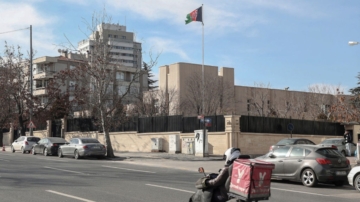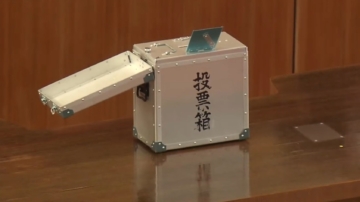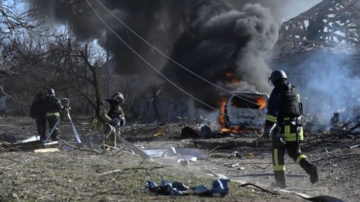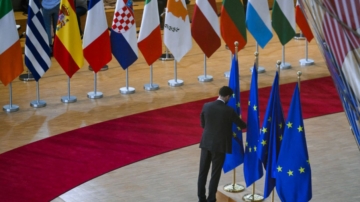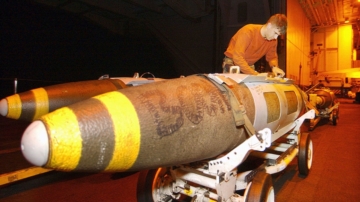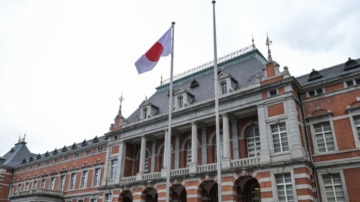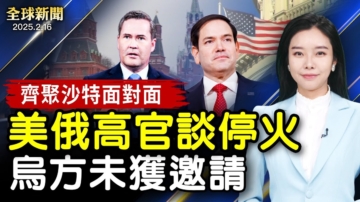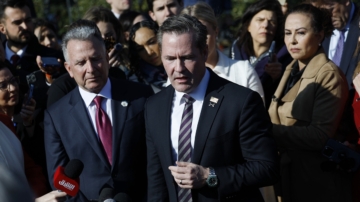【新唐人2014年02月25日讯】这几天,乌克兰政局巨变成为全世界媒体的焦点。乌克兰原政府对抗议民众暴力清场,但军方拒绝屠杀民众。这让不少中国人想起了1989年的六四天安门屠杀。从乌克兰人民身上中国人得到了甚么启发?现在中国人为甚么相信体制内的军人也在觉醒?请看详细内容。
24号,来自乌克兰的最新消息是:乌克兰临时政府签发逮捕令,以“屠杀罪”通缉前总统亚努科维奇。在民间,乌克兰民众把混进抗议人群中打、砸、抢、烧的便衣军人,抓起来示众。
乌克兰国会22号已经罢黜了亚努科维奇的总统职务,并释放反对派领袖——前总理季莫申科。乌克兰国会确定在今年5月25号举行大选。季莫申科被认为将会参选。
据了解,22号当天亚努科维奇打算搭机逃往俄罗斯时,被边境警察拦截。亚努科维奇目前行踪不明。同一天,季莫申科获释后,直接前往乌克兰首都基辅市中心的独立广场。在反政府抗议者们的欢迎声中,她盛赞乌克兰人民是改变历史的英雄。
乌克兰变天的过程,令很多中国人回想起,1989年中共在北京天安门广场的“六四屠杀”事件。当年中共军队开枪扫射学生群众,但是,也出现38军少将徐勤先军长拒绝屠杀老百姓而被判刑的情况。
孙文广:“最主要的,中国的民众应该认识,你要争自由、争民主、要维权。最重要的方式就是民众联合起来,用示威的方式争取这些权利。因为它没有办法完全阻止民众上广场。”
22号,反政府的抗议民众呼吁乌克兰彻底“取缔共产党”,并指控共产党是“犯罪组织”。有抗议民众抓到开枪的凶手后,把他按倒跪地,命令他对死难者忏悔谢罪。季莫申科表示,对屠杀者要严惩。
原山东大学教授孙文广:“现在中国大陆这个事情很有意义。在这个威权的国家,没有充分实行民主自由,早晚民众会起来反抗,改变这种统治的模式。中国的民众要有些勇敢精神,要向乌克兰的这些广场上的英雄学习。”
大陆南方街头运动倡导者王爱忠:“走向民主肯定是一个历史的潮流,中共也挡不住。目前南方街头运动蓬勃兴起,走上街头的人是越来越多。未来的中国,通过民众大规模的街头运动结束一个政权,我觉得这是可能的一种途径。”
去年11月,亚努科维奇暂停了乌克兰和欧盟的联盟协议,并亲近俄罗斯,乌克兰民众因此爆发了全国范围的大规模抗议示威活动。今年2月18号开始的民众抗议,22号遭到了乌克兰当局的暴力镇压。
视频显示,乌克兰当局对手无寸铁的抗议民众开枪,连救护人员都被打。目前已知有82人遇难。22号,乌克兰四大安全机关的负责人一致向议会承诺,不会干预政府和反对派之间的冲突。
大陆网友“华夏匹夫”认为,警察、军队的反戈一击,对乌克兰的政局变化起到了很大的作用。他注意到中国民间的普遍觉醒影响了体制内的群体。当民间觉醒的力量壮大到了一定程度时,体制内觉醒的人会爆发式的出现。
大陆南方街头运动倡导者王爱忠认为,当今的中国人对中共暴政的觉知能力,与“六四”当年相比,已经今非昔比。
王爱忠:“20年前跟现在情况已经完全不一样。因为网路信息的畅通,民众,包括甚至军方、政府部门都发生了改变。中共再像六四那样,首先国际社会也不会允许他们这么干﹔第二,军方跟警察也不会这么干,会站到人民这一边,跟乌克兰一样。”
美国《大纪元》新闻网2004年底推出系列社论《九评共产党》,随后引发中国人的“退党大潮”。到目前为止,已有1亿5千8百多万人,在《大纪元退党网站》声明退出中共的党、团、队组织。其中包括大量中共体制内的各级官员。
采访编辑/唐音 后制/钟元
Ukrainian Army Stays out of Domestic Political Crisis,
A Hit to the Chinese Communist Regime
Political upheaval in Ukraine continues to draw world attention.
Ukraine's former government violently has suppressed protesters,
but the Ukrainian army refuses to massacre the people, making
many Chinese think of the 1989 Tiananmen Square massacre.
What inspiration have the Chinese gained from Ukraine's army?
Why are Chinese saying Chinese soldiers are also awakening?
Our reporter has the story.
The Ukraine interim government has issued an arrest warrant
for former president Viktor Yanukovich for mass murder
in the latest developments in Ukraine.
On the streets, undercover officials conducted beating, smashing,
looting, and burning during the protests were arrested and
put under public display.
Ukrainian parliament ousted president Yanukovych, released
opposition leader and former prime minister Yulia Tymoshenko
on Feb. 22, and decided on an early election for May 25.
Tymoshenko will likely run for the presidency.
Former president Yanukovych was said by Ukrainian officials
to have been stopped by border police while attempting to fly
to Russia aboard a private plane.
Yanukovych has since gone missing.
On the same day, Yulia Tymoshenko went directly
to the capital, Kiev's Independence Square.
In a hail of the anti-government protesters,
she told the crowd that they are the heroes.
The Ukrainian political struggle has reminded many Chinese
of the June 4 massacre on Beijing's Tiananmen Square in 1989,
when the People's Liberation Army opened fire at the students.
But commander Xu Qinxian of the 38th Group Army
refused to use force against the demonstrators and
was then court-martialed, and jailed for five years.
Sun Wenguang, former Shandong University professor: "Most
importantly, the Chinese should know that to fight for freedom,
democracy and rights, people must unite and fight for it with
demonstrations. No demonstration can be completely stopped."
The protesters have called on Ukraine to completely
liquidate the Communist Party,
and accused the Communist Party of being a criminal group.
A sniper was reportedly caught by the anti-government
protesters and forced to apologize and repent to the victims.
Tymoshenko also said that those behind the violence must be
punished.
Professor Sun Wenguang: "The Ukraine incident holds
great meaning for China.
Without freedom or democracy, sooner or later, people under
an authoritarian state will revolt and change the ruling.
The Chinese must be brave and learn from the heroes in the
Kiev's Independence Square."
Wang Aizhong, Southern Street Movement activist: "Democracy
is a historical trend that the Communist regime can not stop.
In China, more and more people are taking to the streets
following the Southern Street Movement.
I think it's likely for China to end the dictatorship through
mass protests in the streets."
Ukraine's ex-president Yanukovych's shelving an agreement
with the EU in November and instead turning to Russia
is what set off the wave of protests throughout Ukraine.
Protesters began meeting violent crackdowns of deadly force
by the government from Feb. 18 to 22.
An online video shows Ukrainian authorities opening fire
on the unarmed protesters, even the medics.
So far, at least 82 people are known to have been killed.
On Feb. 22, the Ukrainian parliament was guaranteed by the
security chiefs of the country that they would not intervene
in the country's political crisis.
Chinese netizen Huaxia Pifu posted on the Internet that
the Ukrainian police and military's stepping back from
the crackdown has played a significant role to the country.
He noted the impact widespread awakening among Chinese
has had on the people within the system.
When the societal awakening has grown power, the awakening
within the system will occur in an explosive way.
South Street Movement activist Wang Aizhong believes the
Chinese today have a much clearer understanding of the
tyranny of the Communist regime than the Chinese in 1989.
Wang Aizhong: "A lot has changed since 20 years ago.
The Internet era and free flow of information have changed
the people, the army, and the government.
The international community will not tolerate another
massacre incident like that of 1989.
The army and the police will also stand with the people,
like those in Ukraine."
Since the editorial series Nine Commentaries on the
Communist Party was published by the Epoch Times in 2004,
waves of Chinese have been quitting the Communist Party.
Many Chinese officials of various governmental levels
are among the more than 158 million Chinese who have quit
and denounced the CCP and its associated organizations.
Interview & Edit/Tang Yin Post-Production/Zhong Yuan
24号,来自乌克兰的最新消息是:乌克兰临时政府签发逮捕令,以“屠杀罪”通缉前总统亚努科维奇。在民间,乌克兰民众把混进抗议人群中打、砸、抢、烧的便衣军人,抓起来示众。
乌克兰国会22号已经罢黜了亚努科维奇的总统职务,并释放反对派领袖——前总理季莫申科。乌克兰国会确定在今年5月25号举行大选。季莫申科被认为将会参选。
据了解,22号当天亚努科维奇打算搭机逃往俄罗斯时,被边境警察拦截。亚努科维奇目前行踪不明。同一天,季莫申科获释后,直接前往乌克兰首都基辅市中心的独立广场。在反政府抗议者们的欢迎声中,她盛赞乌克兰人民是改变历史的英雄。
乌克兰变天的过程,令很多中国人回想起,1989年中共在北京天安门广场的“六四屠杀”事件。当年中共军队开枪扫射学生群众,但是,也出现38军少将徐勤先军长拒绝屠杀老百姓而被判刑的情况。
孙文广:“最主要的,中国的民众应该认识,你要争自由、争民主、要维权。最重要的方式就是民众联合起来,用示威的方式争取这些权利。因为它没有办法完全阻止民众上广场。”
22号,反政府的抗议民众呼吁乌克兰彻底“取缔共产党”,并指控共产党是“犯罪组织”。有抗议民众抓到开枪的凶手后,把他按倒跪地,命令他对死难者忏悔谢罪。季莫申科表示,对屠杀者要严惩。
原山东大学教授孙文广:“现在中国大陆这个事情很有意义。在这个威权的国家,没有充分实行民主自由,早晚民众会起来反抗,改变这种统治的模式。中国的民众要有些勇敢精神,要向乌克兰的这些广场上的英雄学习。”
大陆南方街头运动倡导者王爱忠:“走向民主肯定是一个历史的潮流,中共也挡不住。目前南方街头运动蓬勃兴起,走上街头的人是越来越多。未来的中国,通过民众大规模的街头运动结束一个政权,我觉得这是可能的一种途径。”
去年11月,亚努科维奇暂停了乌克兰和欧盟的联盟协议,并亲近俄罗斯,乌克兰民众因此爆发了全国范围的大规模抗议示威活动。今年2月18号开始的民众抗议,22号遭到了乌克兰当局的暴力镇压。
视频显示,乌克兰当局对手无寸铁的抗议民众开枪,连救护人员都被打。目前已知有82人遇难。22号,乌克兰四大安全机关的负责人一致向议会承诺,不会干预政府和反对派之间的冲突。
大陆网友“华夏匹夫”认为,警察、军队的反戈一击,对乌克兰的政局变化起到了很大的作用。他注意到中国民间的普遍觉醒影响了体制内的群体。当民间觉醒的力量壮大到了一定程度时,体制内觉醒的人会爆发式的出现。
大陆南方街头运动倡导者王爱忠认为,当今的中国人对中共暴政的觉知能力,与“六四”当年相比,已经今非昔比。
王爱忠:“20年前跟现在情况已经完全不一样。因为网路信息的畅通,民众,包括甚至军方、政府部门都发生了改变。中共再像六四那样,首先国际社会也不会允许他们这么干﹔第二,军方跟警察也不会这么干,会站到人民这一边,跟乌克兰一样。”
美国《大纪元》新闻网2004年底推出系列社论《九评共产党》,随后引发中国人的“退党大潮”。到目前为止,已有1亿5千8百多万人,在《大纪元退党网站》声明退出中共的党、团、队组织。其中包括大量中共体制内的各级官员。
采访编辑/唐音 后制/钟元
Ukrainian Army Stays out of Domestic Political Crisis,
A Hit to the Chinese Communist Regime
Political upheaval in Ukraine continues to draw world attention.
Ukraine's former government violently has suppressed protesters,
but the Ukrainian army refuses to massacre the people, making
many Chinese think of the 1989 Tiananmen Square massacre.
What inspiration have the Chinese gained from Ukraine's army?
Why are Chinese saying Chinese soldiers are also awakening?
Our reporter has the story.
The Ukraine interim government has issued an arrest warrant
for former president Viktor Yanukovich for mass murder
in the latest developments in Ukraine.
On the streets, undercover officials conducted beating, smashing,
looting, and burning during the protests were arrested and
put under public display.
Ukrainian parliament ousted president Yanukovych, released
opposition leader and former prime minister Yulia Tymoshenko
on Feb. 22, and decided on an early election for May 25.
Tymoshenko will likely run for the presidency.
Former president Yanukovych was said by Ukrainian officials
to have been stopped by border police while attempting to fly
to Russia aboard a private plane.
Yanukovych has since gone missing.
On the same day, Yulia Tymoshenko went directly
to the capital, Kiev's Independence Square.
In a hail of the anti-government protesters,
she told the crowd that they are the heroes.
The Ukrainian political struggle has reminded many Chinese
of the June 4 massacre on Beijing's Tiananmen Square in 1989,
when the People's Liberation Army opened fire at the students.
But commander Xu Qinxian of the 38th Group Army
refused to use force against the demonstrators and
was then court-martialed, and jailed for five years.
Sun Wenguang, former Shandong University professor: "Most
importantly, the Chinese should know that to fight for freedom,
democracy and rights, people must unite and fight for it with
demonstrations. No demonstration can be completely stopped."
The protesters have called on Ukraine to completely
liquidate the Communist Party,
and accused the Communist Party of being a criminal group.
A sniper was reportedly caught by the anti-government
protesters and forced to apologize and repent to the victims.
Tymoshenko also said that those behind the violence must be
punished.
Professor Sun Wenguang: "The Ukraine incident holds
great meaning for China.
Without freedom or democracy, sooner or later, people under
an authoritarian state will revolt and change the ruling.
The Chinese must be brave and learn from the heroes in the
Kiev's Independence Square."
Wang Aizhong, Southern Street Movement activist: "Democracy
is a historical trend that the Communist regime can not stop.
In China, more and more people are taking to the streets
following the Southern Street Movement.
I think it's likely for China to end the dictatorship through
mass protests in the streets."
Ukraine's ex-president Yanukovych's shelving an agreement
with the EU in November and instead turning to Russia
is what set off the wave of protests throughout Ukraine.
Protesters began meeting violent crackdowns of deadly force
by the government from Feb. 18 to 22.
An online video shows Ukrainian authorities opening fire
on the unarmed protesters, even the medics.
So far, at least 82 people are known to have been killed.
On Feb. 22, the Ukrainian parliament was guaranteed by the
security chiefs of the country that they would not intervene
in the country's political crisis.
Chinese netizen Huaxia Pifu posted on the Internet that
the Ukrainian police and military's stepping back from
the crackdown has played a significant role to the country.
He noted the impact widespread awakening among Chinese
has had on the people within the system.
When the societal awakening has grown power, the awakening
within the system will occur in an explosive way.
South Street Movement activist Wang Aizhong believes the
Chinese today have a much clearer understanding of the
tyranny of the Communist regime than the Chinese in 1989.
Wang Aizhong: "A lot has changed since 20 years ago.
The Internet era and free flow of information have changed
the people, the army, and the government.
The international community will not tolerate another
massacre incident like that of 1989.
The army and the police will also stand with the people,
like those in Ukraine."
Since the editorial series Nine Commentaries on the
Communist Party was published by the Epoch Times in 2004,
waves of Chinese have been quitting the Communist Party.
Many Chinese officials of various governmental levels
are among the more than 158 million Chinese who have quit
and denounced the CCP and its associated organizations.
Interview & Edit/Tang Yin Post-Production/Zhong Yuan

